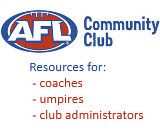Coaching course sets world standard
AN AFL coaching program believed to be the first of its kind in the world conducted its inaugural national conference in Melbourne last weekend.
Involving 110 umpire coaches from local community umpiring groups in every Australian state, the two-day conference for the AFL Umpire Coach Professional Development Program was held at Flemington Racecourse.
Largely run by participants completing their third year of the program, it aims to encourage behavioural change in coaches to improve the umpire training environment.
Program facilitator and former AFL umpires coach David Levens, who has also worked with Cricket Australia on their umpire high performance panel, said the program was unique.
"There's no doubt [that with] umpire high performance in sports, they do stuff there," Levens said.
"But at community level, to get coaches from south of Perth, Townsville, Cairns, across Victoria together and involved in a program that’s ongoing ... my experience would suggest it wouldn’t happen anywhere else certainly in this country, and I’d suggest internationally."
The program has first, second and third year development phases, and involves regular interaction and discussions with Levens.
He said the coach was the "critical resource" in community football, and creating a motivational environment was vital to recruiting and retaining community umpires.
"A lot of coaching is done telling: 'I’ll tell you what you did wrong, I’ll tell you how to fix it'. We’re encouraging a much more conversational approach," Levens said.
"If we have an enjoyable environment we go to – it’s fun, it’s interactive, we want to go back. And we usually tell others about it.
"If we get there and it’s dull, it’s boring, it’s the same old stuff – hum drum, spoken at, not valued, we tell others and don’t go back."
Encouraging a high level of ownership in their training is designed to create a challenging and interactive environment that steps away from traditional methods of coaching.
Promoting discussion and analysis during training not only helps to teach umpires the valuable skill of self-criticism; indirectly, it is a process that produces valuable coaches of the future.
Anecdotal feedback suggests the change in tack is making the coaching process more effective and, in turn, more enjoyable.
"They’re probably not putting any extra time in, but they’re doing it smarter and they’re probably feeling better about what it is they’ve done and how they’re doing it," Levens said.
"You get the environment right, and have a high level of ownership and involvement by umpires, and you have an interesting program, [that's] challenging [then] you’re likely to attract people and retain them."
- Chelsea Roffey
(1266)
|
|
|






